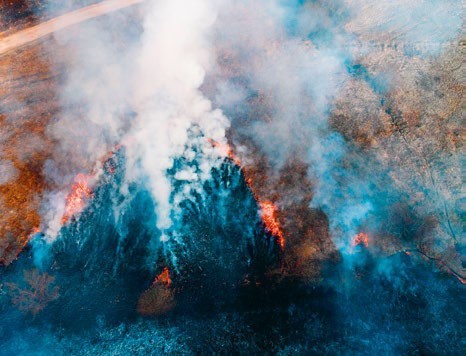But we won’t let it burn. This is how to do your part in the climate crisis.


"With climate change, we’re only seeing the tip of the iceberg"
One year ago, Greta Thunberg made history in her address at the World Economic Forum in Davos. “Our house is on fire,” she told the world’s political and industrial leaders. “We are facing a disaster of unspoken sufferings for enormous amounts of people. And now is not the time for speaking politely or focusing on what we can or cannot say. Now is the time to speak clearly.” Her words were stunning—clear but confrontational, confident but also beseeching. 2019 was also the same year when we learnt that several countries were shipping tonnes of plastic waste to illegal recycling factories in Jenjarom, Malaysia. A shocking 450 tonnes of contaminated waste were returned to those countries after that. It’s 2020, but where are we in environmental conservation? Have we done enough? Climate change is the theme for Earth Day 2020 (22 April)—the most pressing topic for its 50th anniversary—and it’s time we take this matter seriously.

"The 2019 Australian bush fires destroyed 11 million hectares of bush"
BURNING QUESTION
Greta’s 2019 speech at Davos was the clarion call heard around the world, and the subsequent events of the year only confirmed her worst predictions. It was the second hottest year on record, and fires raged around the globe. A deadly series of wildfires decimated the Amazon rainforest. The worst fires in decades raged in Australia. After more than six months of fires more than 7.3 million hectares of land have burned across the country, killing 28 people, millions of animals and affecting half a billion animals.
Experts agree that climate change has worsened the scope and severity of Australia’s fires. Meanwhile President Donald Trump withdrew the US from the Paris Agreement, the international accord under which countries work together to combat climate change. So when Greta spoke again, her tone had not softened. “Our house is still on fire,” she said darkly. “Your inaction is fuelling the flames by the hour.”
Chances are, unlike the multinational corporations and industry giants dragging their feet about implementing change, you’ve already done something about your environmental impact. There are hundreds of tiny ways each of us can effect meaningful change in our daily lives: cut down on single-use plastics; recycle; eat produce sourced and grown locally. Reducing your carbon footprint is the easiest and most immediate way you can be proactive and cut through the noise of climate-change deniers and prevaricators.

"As many as 480 million mammals, birds and reptiles would have been affected by the fires in Australia"
BIG MOVES
The bad news: ultimately the biggest power to make widespread, long-term, effective change lie in the hands of huge corporations whose interests are more likely to lie with profit than social responsibility. Corporations that harvest and source fossil fuels; corporations who would rather send customer returns straight to landfills than bother with the logistics of incorporating the stock back into warehouses.
The fashion industry alone produces 10% of the world’s carbon emissions, and is the second-largest consumer of the world’s water supply. Synthetic fabrics are leaching microplastics into the water every time you wash them; fast fashion denim pollutes waterways with dye and chemicals that affect people and animals.
But still, there is good news: it’s within our power to make these companies change. Your biggest power as a consumer is your wallet — use it to tell companies or any brand we let into our daily lives that you want better. When you buy new, choose to buy from companies with a demonstrated record of fair trade and environmental ethics.

"In January, Jakarta, Indonesia had its most intense rainfall in 24 years caused by increased temperatures in the Indian Ocean"
THINK CLEAN
Fashion Revolution’s Transparency Index is a great resource to find out exactly what the biggest fashion companies in the world do and do not do in terms of their social and environmental policies. And wherever possible, extend the life of what you already have—instead of picking up something new for every party, choose to buy vintage, secondhand, or shop your own wardrobe. Studies have shown that extending the life of your clothing for a mere nine months could reduce the annual carbon, water and waste ootprints of clothing by up to 30%.
And the best way to make your voice heard as a citizen? Find out what measures are being put in place to curb pollution and single-use plastics within your vicinity—be t at home or work. Get in touch with your MP about your concerns and suggestions. Use social media to amplify messages, and always bring your own container. Even small steps can help make a larger difference.
THE CRISIS BY NUMBERS
8 MILLION TONS OF PLASTIC ENTER THE OCEANS EACH YEAR
Information sourced from WeSupply — a socially environmentally conscious platform. Visit them at wesupply.xyz.























